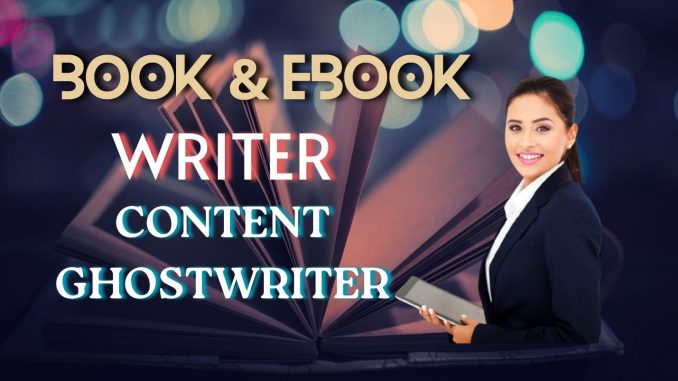
In today’s digital age, ebooks have revolutionized the publishing industry, providing authors with a platform to share their stories and knowledge with a global audience. Crafting a compelling ebook requires a unique set of skills, including a deep understanding of the target audience, effective writing techniques, and the ability to engage readers in a digital format. In this article, we will explore the art of ebook writing company for uncover valuable tips and tricks to help aspiring authors create captivating and successful digital books.
Role of Professional Ghostwriters in Ebook Writing
Professional ghostwriters play a crucial role in the ebook writing process. They are skilled writers who collaborate with authors to bring their ideas and stories to life. Ghostwriters possess the ability to adapt their writing style to match the author’s voice and vision, ensuring a seamless reading experience. They bring expertise in various genres and writing techniques, offering valuable insights and creative solutions to enhance the overall quality of the ebook. Working with a professional ghostwriter can help authors streamline the writing process, overcome challenges, and produce a polished and engaging final product.
Choosing the Right Topic and Target Audience

Before diving into ebook writing, it’s essential to choose a topic that resonates with the target audience. Conduct thorough research to identify popular trends, gaps in the market, and subjects that are of interest to readers. Consider your own expertise and passion when selecting a topic to ensure that you can provide unique insights and value to your readers. Understanding your target audience is equally important. Define their demographics, preferences, and needs to tailor your writing style, language, and content to effectively engage them.
Planning and Outlining Your Ebook
A well-structured ebook sets the foundation for a successful writing process. Start by outlining the main sections or chapters of your ebook, identifying key themes, and organizing your content in a logical flow. This outline will serve as a roadmap, keeping your writing focused and cohesive. Break down each chapter into subtopics or sections, allowing for smooth transitions and easy readability. Consider incorporating visual elements such as images, infographics, or charts to enhance the overall visual appeal of your ebook.
Creating Engaging and Compelling Content
Captivating your readers’ attention from the very first page is crucial in ebook writing. Start with a compelling introduction that hooks the reader and establishes the value they will gain from reading your book. Use storytelling techniques to create an emotional connection and keep readers engaged throughout the ebook. Break down complex ideas into digestible and accessible content, using clear and concise language. Include examples, case studies, or anecdotes to illustrate your points and make them relatable to the reader. Use subheadings, bullet points, and formatting techniques to improve readability and make your ebook visually appealing.
Writing Style and Tone
The writing style and tone of your ebook will largely depend on your target audience and the subject matter. Determine whether a formal, professional, conversational, or informal tone is most appropriate for your readers. Consistency in tone is important to maintain a cohesive reading experience. Strike a balance between being informative and engaging, avoiding excessive jargon or technical language that may alienate readers. Incorporate a personal touch by sharing anecdotes or experiences that relate to the topic, allowing readers to connect with you on a deeper level.
Editing and Proofreading
Editing and proofreading are crucial steps in the ebook writing process. Once you have completed your initial draft, set it aside for a while to gain fresh perspective before revisiting it for editing. Read through your ebook multiple times, focusing on grammar, punctuation, spelling errors, and sentence structure. Ensure that your ideas are clearly articulated and transitions between sections are smooth. Consider enlisting the help of professional editors or proofreaders to ensure a polished and error-free final product.
Publishing and Marketing Your Ebook

With the completion of your ebook, it’s time to publish and market it effectively. Consider the various publishing platforms available, such as Amazon Kindle Direct Publishing (KDP), Smashwords, or other self-publishing platforms. Research the specific requirements and formatting guidelines for each platform to ensure a seamless publishing process. Develop a comprehensive marketing strategy that includes promoting your ebook through social media, author websites, email newsletters, and collaborations with influencers or other authors. Engage with your readers through book signings, webinars, or virtual events to build a strong author-reader connection.
Last Words
The art of ebook writing requires a combination of creativity, strategic thinking, and a deep understanding of readers’ needs. Affordable ghostwriting agency can be invaluable partners in this process, helping authors bring their ideas and stories to life with expertise and finesse. By carefully selecting the right topic, understanding your target audience, planning and outlining your ebook, creating engaging content, and paying attention to the writing style and tone, you can craft a compelling ebook that resonates with readers and leaves a lasting impact. With the right publishing and marketing strategies, your ebook has the potential to reach a global audience and establish you as an authority in your field. Embrace the power of ebook writing and unleash your creativity to share your unique story with the world.
Leave a Reply